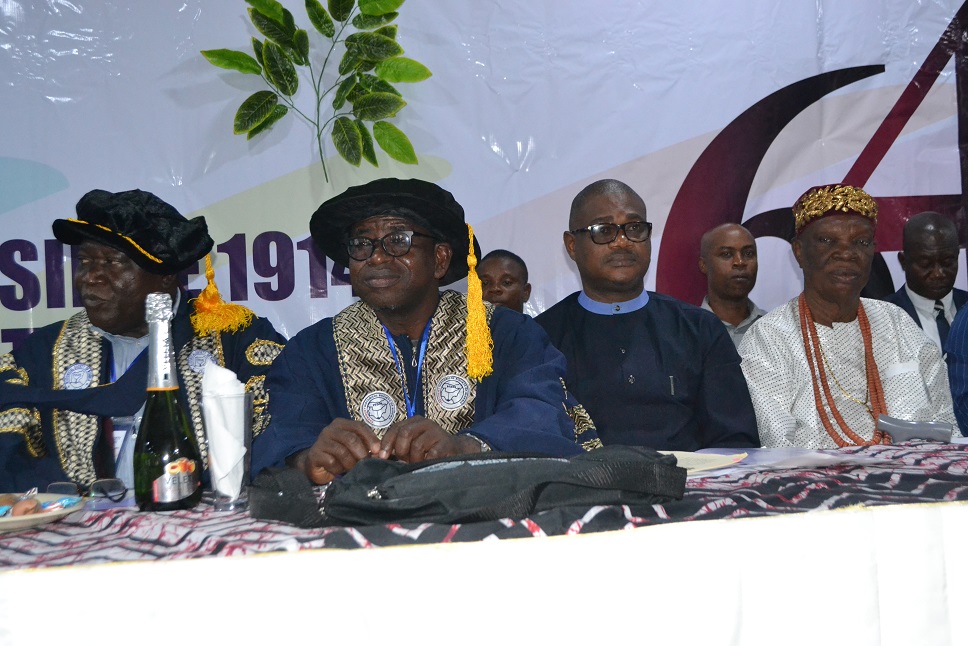Prof Yakubu Aboh Ochefu, former president Historical Society of Nigeria (HSN) (left) Prof Okpe O. Okpe Jnr, president HSN, (second left) Lawrence Ejofor Commissioner for Culture and Turism/representative of Governor Okowa (second right) and HRM Emmanuel Efeizomor 11, the Obi of Owa during HSN 64th congress/conference in Asaba Delta State on Monday.PHOTO: GODDY UMUKORO
The point has been made that to move Nigeria forward, and away from current crises of enormous proportion is the critical need to promote a culture of dialogue as a basis for upholding understanding and building consensus and moving forward.
This was the submission of Okpeh o. Okpeh, jnr, president of the Historical Society of Nigeria (HSN), while presenting his opening speech at the just concluded 64th Annual Congress of the society in Asaba, the Delta State capital.

He pointed out that the perspective of the HSN is that the task of rebuilding Nigeria is everybody’s given the antecedents of the nation and its diverse nature of the country.
Prof. Okpeh said that the HSN is seeking a strategic partnership with the National Assembly to legislate on history as an important body of knowledge necessary for national value reorientation, national consciousness and integration in contemporary Nigeria. “The idea is to protect our national and collective experience and heritage from the excitements and threats from some technocrats and politicians in government. We are seeking positive collaborations with all citizens as stakeholders in this national project,” he said.
He continued: “This congress is taking place at a very important moment in the lifespan of the Society and indeed Nigeria. First, not only is the country grappling with crises of enormous proportion, but the nature and character of these crises have continued to eat deep into the carapace the nation. From an ailing economy to rising youth unemployment; from the challenge of insecurity to the incubus of corruption; and from a largely short-circuited and dysfunctional democracy to a fractured social process riddled with abject poverty; Nigeria has continued to slide almost irretrievably into the abyss of underdevelopment and anarchy, regardless of her enormous resources.
“And while the buffalos of poverty, disease and insecurity are ravaging the land, political power mongers are engaged in a titanic confrontation which has nothing to do whatsoever, with the welfare needs of the mass of the people. Arising from these, legitimate concerns have continued to be expressed regarding the future of this otherwise great country.
“For example, the question whether or not Nigeria can/should continue to exist in her current state has continued to be posed by some critical observers. This has elicited at least two broad ideologically entrenched viewpoints: (i) Those who see nothing particularly unusual about the state of the nation; and (ii) Those who feel everything is wrong with the nation.
“It is in the light of the above that the Council of the HSN decided to focus its critical lenses on the country’s journey into nationhood since its emergence in 1914. We are therefore in Asaba to interrogate the centripetal and centrifugal forces which have collectively shaped and continue to shape nation building process and efforts in Nigeria. We can hardly do otherwise given our training as the custodians of the country’s history and heritage and particularly as patriots.
“We believe and are convinced that a profound knowledge of the history of this country would help sharpen our perspectives as we fashion out solutions to the current state of our nation. This is indeed the case because no nation can possibly develop beyond the knowledge it possesses about itself and the forces affecting it,” Prof. Okpeh said.
Delivering the lecture titled: “Building the Nigeria nation since 1914: Motion, movement and actors,” Prof. Onwuka Njokwu , the keynote speaker criticized successive administrations in Nigeria for not living up to their responsibilities of nation building but for indulging in selfish pursuits.
He said: “The greatest tragedy of our time is taking our money to foreign countries. When a leader becomes a prey to the led, forget about nation building. We need in Nigeria a government that is conscious of its responsibility. Nigerian leaders should come together and ask the questions, and provide answers to them themselves.”
In his speech read on his behalf by the Commissioner for Culture and Tourism, Mr. Lawrence Ejiofor, Governor Ifeanyi Okowa of Delta State who deposed that history is critical to human existence, said: ”We understand the present even better if we are able to shed light on the past. Or, how are we to know whether we have made progress or otherwise”.
Okowa, drawing from the theme of the conference, said it was doubtful if the motion, movement and actors of the country have always been in the right direction. “There is no gainsaying the fact that ethnic, religious and sometimes, cultural cleavages have tended to stunt our growth and mar every motion, movement and actors, which would have taken the country to greater heights.”
However, the governor said the real question is why has the task of nation building been so difficult in Nigeria and the fruits so scanty, despite our enormous human and natural resources? “ We should look for the answer in two critical areas: the quality of leadership that has confronted these challenges and the fragility of political and development institutions. We need to understand these, so we can clearly identify our strengths, weaknesses, and core challenges,” Okowa said, pointing out that the nation needs to evolve a system of leadership selection and accountability, which produces the sort of leaders who will confront the challenges in a way that is beneficial to nation-building.
“As I pointed out above, nations are products of the human will and imagination, including the institutions that sustain their collective efforts. Therefore, we must find these resources in ourselves if we are to succeed in building our nation,” Governor Okowa said.




GIPHY App Key not set. Please check settings